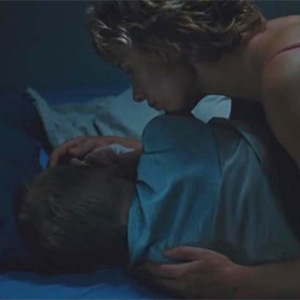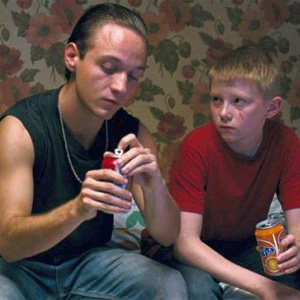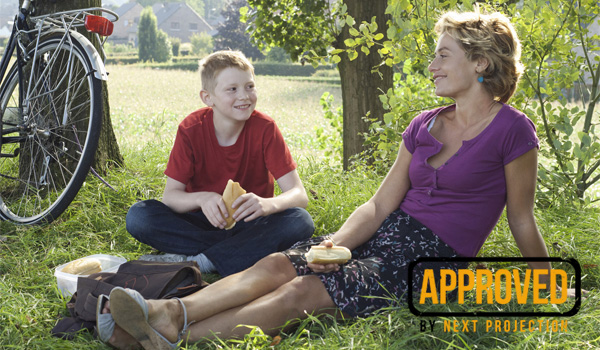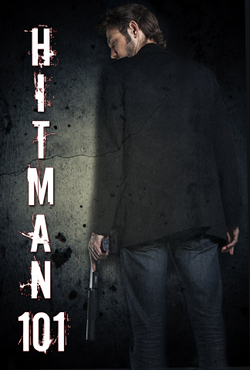Review: The Kid with a Bike (2011)
Cast: Thomas Doret, Cécile De France, Jérémie Renier, Fabrizio Rongione
Director: Jean-Pierre Dardenne | Luc Dardenne
Country: Belgium | France | Italy
Genre: Drama
Official Trailer: Here
Editor’s Notes: The Kid with a Bike opens theatrically in select cities starting March 16th.
The Kid with a Bike is a post-modern fairytale about a young street urchin whose father has abandoned him and he is forced to internalize life lessons far too early. It pays homage to films dealing with childhood alienation that came before; most self-evident is the connection to Vittorio De Sica’s Bicycle Thieves, through both title and subject matter. The primary difference is that we are dealing with a more narcissistic father whose moral ambiguity comes out of a place of selfishness rather than a sense of fatherly obligation. The result is that the boy feels alienated and lashes out against the environment that has treated him so unfairly, and one sees the hopelessness and feelings of abandonment in his all too young eyes. The Dardenne brothers illustrate the boy’s inherent innocence by focusing on him as he sleeps; serving as a gentle reminder of the fact that it is society that has failed Cyril and not the other way around.
Cyril is an intelligent twelve year old boy that has learned lessons about the nature of the world that one should not learn until adulthood when they are better prepared to process the lessons. He possesses an emotional maturity for his age, but is still unable to understand the reasons that he has been rejected by his own father. He wears a bright red shirt for most of the film in a desperate attempt to seek attention from the surrounding world, but without the necessary tools to protect him from those that would try to exploit his naiveté his bright red shirt makes him an easy target. He either refuses or is incapable of understanding that father has abandoned him, and he has not yet had enough life experience to understand that adults can be flawed and that his father is not infallible. Inch by inch he has his heart broken as he learns the truth that his father had sold his bicycle and robbed the boy of his childhood.
The result is that the boy feels alienated and lashes out against the environment that has treated him so unfairly, and one sees the hopelessness and feelings of abandonment in his all too young eyes. The Dardenne brothers illustrate the boy’s inherent innocence by focusing on him as he sleeps; serving as a gentle reminder of the fact that it is society that has failed Cyril and not the other way around.
 Like any young boy that has been rejected by his father, he seeks out other father figures to fill the gaps. He finds the attention that he seeks in a young man known as “The Dealer”, a Fagin-esque character straight out of Oliver Twist that senses the emotional vulnerability of Cyril and characteristically exploits it. We sense danger in every moment that Cyril spends with “The Dealer”, and we instinctively know that Cyril will be robbed of his innocence yet again because of his vulnerabilities and emotional immaturity. “The Dealer” takes Cyril back to his apartment, and we can sense that something is terribly wrong with this relationship and we feel fear for young Cyril, even though we are given only subtle clues that something is amiss. We know that Cyril will likely lose his last shred of innocence if he stays in that environment, but we are powerless to stop it as we are forced to sit by and wait to see how this loss of innocence will manifest itself. We aren’t sure if “The Dealer” will exploit Cyril sexually, but the tension is palpable in this classic fairytale scenario of enticement and youthful corruption. The Dardenne brothers do not go down that path as it would rob the film of its emotional earnestness, but we still carry that fear for Cyril just as a concerned parent would.
Like any young boy that has been rejected by his father, he seeks out other father figures to fill the gaps. He finds the attention that he seeks in a young man known as “The Dealer”, a Fagin-esque character straight out of Oliver Twist that senses the emotional vulnerability of Cyril and characteristically exploits it. We sense danger in every moment that Cyril spends with “The Dealer”, and we instinctively know that Cyril will be robbed of his innocence yet again because of his vulnerabilities and emotional immaturity. “The Dealer” takes Cyril back to his apartment, and we can sense that something is terribly wrong with this relationship and we feel fear for young Cyril, even though we are given only subtle clues that something is amiss. We know that Cyril will likely lose his last shred of innocence if he stays in that environment, but we are powerless to stop it as we are forced to sit by and wait to see how this loss of innocence will manifest itself. We aren’t sure if “The Dealer” will exploit Cyril sexually, but the tension is palpable in this classic fairytale scenario of enticement and youthful corruption. The Dardenne brothers do not go down that path as it would rob the film of its emotional earnestness, but we still carry that fear for Cyril just as a concerned parent would.
Like any young boy that has been rejected by his father, he seeks out other father figures to fill the gaps. He finds the attention that he seeks in a young man known as “The Dealer”, a Fagin-esque character straight out of Oliver Twist that senses the emotional vulnerability of Cyril and characteristically exploits it. We sense danger in every moment that Cyril spends with “The Dealer”, and we instinctively know that Cyril will be robbed of his innocence yet again because of his vulnerabilities and emotional immaturity.
 The Kid With a Bike carries a realistic emotional core set in a storybook format. It lives in real spaces and characters act in a realistic manner, but the narrative structure is as old as storytelling itself. It is in its unwillingness to resort to the emotional shorthand of cinema that gives the film weight, as even though it would be easy to pass morality judgments on Cyril’s father or “The Dealer”, they are still products of their environment and they have given up on finding decency in the world. We sense that Cyril will fall to their same misanthropy, but his saving grace comes in the form of an altruistic woman. Cyril finally finds human decency in a woman named Samantha that takes him in despite his misgivings and troubled behavior. Perhaps it says something of the state of humanity that a twelve year old boy finding someone willing to sacrifice so much of themselves in the salvation and protection of his innocence despite a complete lack of legal culpability seems like a fairytale. We could all take a few lessons from fairytale morality, if for no other reason than to teach us that life is not a zero sum game and selfless empathy is a virtue and not a character flaw.
The Kid With a Bike carries a realistic emotional core set in a storybook format. It lives in real spaces and characters act in a realistic manner, but the narrative structure is as old as storytelling itself. It is in its unwillingness to resort to the emotional shorthand of cinema that gives the film weight, as even though it would be easy to pass morality judgments on Cyril’s father or “The Dealer”, they are still products of their environment and they have given up on finding decency in the world. We sense that Cyril will fall to their same misanthropy, but his saving grace comes in the form of an altruistic woman. Cyril finally finds human decency in a woman named Samantha that takes him in despite his misgivings and troubled behavior. Perhaps it says something of the state of humanity that a twelve year old boy finding someone willing to sacrifice so much of themselves in the salvation and protection of his innocence despite a complete lack of legal culpability seems like a fairytale. We could all take a few lessons from fairytale morality, if for no other reason than to teach us that life is not a zero sum game and selfless empathy is a virtue and not a character flaw.















 Review: The Kid with a Bike (2011)
Review: The Kid with a Bike (2011) Review: Elena (2011)
Review: Elena (2011)

